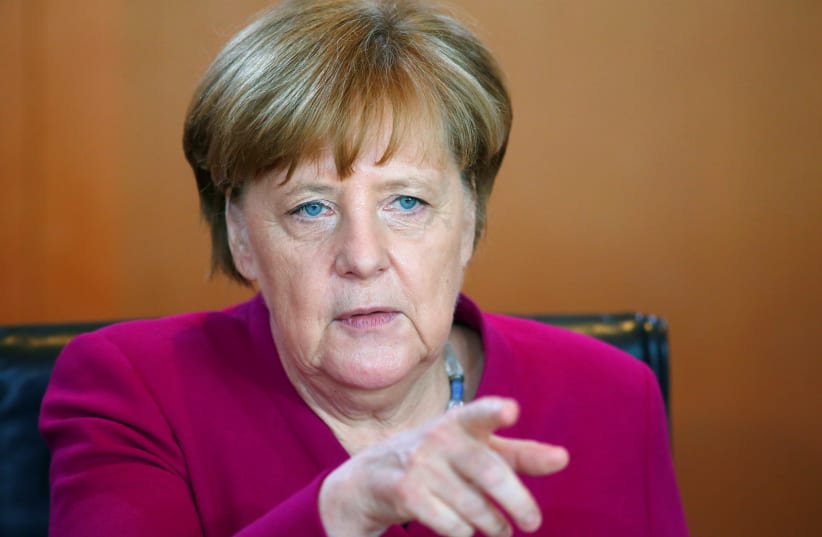The contrast between German Chancellor Angela Merkel’s first visit to Israel and the current one is significant. This is true in regard to the strength of the government she rep- resents, her status in Germany and the attitude toward Germany’s past and present.
Merkel came to Israel for the first time in January 2006 when she was the head of a new coalition government. Her CDU and its Bavarian sis- ter party, CSU had received 35.2% of the vote in the September 2005 parliamentary elections. The other coalition partner, the Socialist SPD, had gained 34.2% of the vote. At that time Merkel was in a position of strength in both Germany and Europe. Those positions have greatly eroded in the past few years.
In the September 2017 elections, support for the CDU/ CSU had fallen to 32.9%. This was the poorest result since the first German elections after World War II. The SPD received only 20.5% of the votes. Never in Germany’s history had the party’s support been so low.
For lack of an alternative, the CDU/CSU and SPD once again formed a coalition government. Recent polls indicate further declines in voting support. If new elections were held these parties would not win enough voters to form a majority government together. Speculations about how long Merkel can stay on as chancellor are rife in the German media.
In 2006 Merkel visited inter alia Yad Vashem. She wrote a quote from the explorer and naturalist Alexander von Humboldt in the guest book: “Those who do not understand the past, have no future.”
During that visit to Israel and her later ones, Merkel spoke about the friendship between the two countries. Yet in 2006 there were strong indications of unease among the German population about Israel. A little published study from the University of Bielefeld in 2004 had found that 68% of Germans believed that Israel was conducting a war of extermination against the Palestinians while 51% thought that Israel was acting toward the Palestinians like the Nazis did against the Jews. The anti-Israel incitement campaign from many German media was already in full force and had helped create these aberrant perceptions.
Against the background of these horrendous opinions, it was reassuring that Merkel was determined to maintain a pro-Israeli position. Subsequent visits of delegations of German ministers for consultations between the two governments over the years have been additional positive signs.
The number of Jews living in Germany played a special role in that country’s perception of itself. Due to substantial immigration from the Soviet Union, the combined membership of the German Jewish communities exceeded for a number of years 100,000 people. It was at its highest point during Merkel’s first visit to Israel. This significant Jewish presence was an indicator of “normalcy” in a country which seemed to understand its past, despite the significant occurrence of antisemitic incidents.
MUCH OF THAT ‘normalcy’ has since been undone. Like other Western European countries, Germany accepted large numbers of immigrants from Muslim countries. The percentage of antisemites among them is substantially higher than among the native German population. Official statistics list all antisemitic incidents in which the perpetrators are unidentified as being caused by the extreme right. This is a convenient distortion of the truth.
The situation deteriorated further when in September 2015 the German government began to pursue a welcome policy for Middle Eastern and North African refugees. That brought in at least 1.5 million refugees, mainly Muslims from countries such as Afghanistan, Iraq and Syria. One result of this policy was the rise of a new anti-Islam party, AfD. In the 2017 elections it entered the German parliament for the first time and became the third largest party with 12.9% of the vote. In most recent polls its support has further increased.
By the end of 2017 the taboo on the important role of Muslim immigrants and their descendants in antisemitic incidents could no longer be maintained. Key politicians started to mention the sizable role of Muslims in attacks on Jews. Left-wing antisemitism is prominent as well and focuses on Israel. Special problems exist in some schools where Jewish children are harassed and cannot defend themselves.
On the average there are four antisemitic incidents registered in Germany every day. Probably a significant additional number are not reported. Many Jewish youngsters ask themselves whether they have a future in their country of birth. The welcome policy has greatly increased the doubts about a “normal’ future for Jews in
Germany. A national Antisemitism Commissioner was appointed a few months ago. Various federal states have also recently named such a functionary. These developments will help understand better the nature of the problems involved and will also clarify how huge the task of fighting antisemitism is. The Bavarian Antisemitism Commissioner, Ludwig Spaenle, is a former Education minister of this federal state. He remarked that when he accepted his new position he was not aware of the multitude of tasks facing him. The need for such official appointments also indicates that Germa- ny has failed in its battle to stamp out antisemitism.
During Merkel’s earlier visits to Israel, collaboration between the two countries was the major topic. This time, Prime Minister Netanyahu and his colleagues would fail German Jewry if they did not give the country’s antisemitism problems also a significant place on the meeting’s agenda.
The writer is the emeritus Chairman of the Jerusalem Center for Public Affairs. He was given the Lifetime Achievement Award by the Journal for the Study of Antisemitism, and the International Leadership Award by the Simon Wiesenthal Center.
